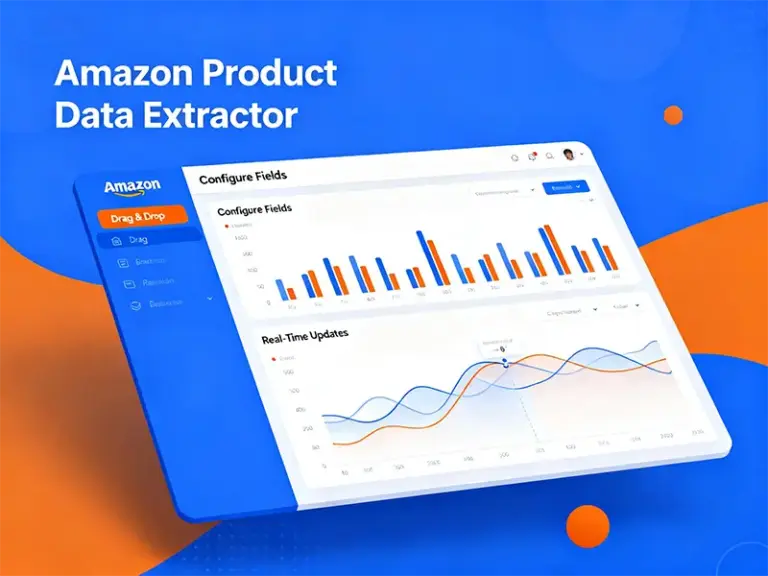As an e-commerce operations professional, do you often encounter this frustration: wanting to obtain competitor price changes, monitor keyword rankings, and analyze hot-selling product data, but feeling helpless because you don’t understand programming? When you see technical colleagues easily calling APIs to obtain massive amounts of data, do you also yearn to have such capabilities? Today, we will solve the challenge of how operations staff batch scrape Amazon data, providing you with a complete no-code solution.
Data Collection Challenges Faced by Operations Staff
In the data-driven e-commerce era, obtaining accurate and timely market information has become a key factor for operational success. However, most operations personnel face similar challenges in data acquisition. First is the high technical barrier—traditional data scraping requires mastering programming languages, understanding webpage structures, handling anti-scraping mechanisms, and other complex technologies, which is obviously unrealistic for personnel focused on market analysis and operational strategies.
Second is the timeliness issue—manual data collection is not only inefficient but often by the time data is organized, market opportunities have already been missed. Especially on highly competitive platforms like Amazon, price changes, inventory status, and ranking fluctuations occur at the minute level, making traditional data collection methods completely inadequate for real-time monitoring needs.
More importantly is the scalability challenge—when you need to monitor hundreds of ASINs, track multiple keywords, and analyze data across different categories, manual operations become completely impractical. Available tools in the market are either functionally limited, prohibitively expensive, or require technical background to use, leaving many operations staff in a dilemma.
Limitations of Traditional Data Collection Methods
Let’s first examine the limitations of traditional data collection methods. The most common approach is manual copy-pasting, which while simple and direct, is extremely inefficient and error-prone. When you need to collect information on dozens of products, it might take an entire morning, and the accuracy and completeness of the data are difficult to guarantee.
Another common practice is using simple scraping tools or browser plugins, but these tools often have limited functionality, cannot handle complex page structures, let alone cope with Amazon’s constantly updated anti-scraping mechanisms. Moreover, these tools typically only capture surface-level basic information and are powerless against deeper data such as user review analysis, related product recommendations, and price history trends.
The biggest problem lies in structured data processing—even if raw data is successfully obtained, how to organize this scattered information into a format usable for analysis becomes another huge challenge. This often requires significant manual processing time and is prone to data inconsistency issues.
Pangolin No-Code Solution: Making Data Collection Simple
Addressing the pain point of how operations staff batch scrape Amazon data, Pangolin has launched a revolutionary no-code solution. This solution includes two core products: the Data Pilot visual configuration tool and powerful Scrape API technical support, perfectly solving the data acquisition challenges faced by operations personnel.
Data Pilot is a visual data collection tool specifically designed for users without technical backgrounds, truly delivering on the promise of “no need to write a single line of code.” Through an intuitive graphical interface, you can easily configure data collection tasks, supporting data collection by keywords, ASINs, stores, rankings, categories, and other methods. More importantly, the system automatically generates customized Excel spreadsheets from collected data that can be directly used for operational analysis, greatly improving work efficiency.
At the technical level, Pangolin Scrape API provides powerful underlying support. This API can dynamically adapt to structural changes in Amazon and other e-commerce platforms, automatically identifying and extracting relevant product data including titles, discounts, prices, availability, and descriptions through intelligent recognition algorithms. Operations staff don’t need to worry about target page DOM structure changes—the system continuously maintains data parsing logic, significantly reducing data integration and maintenance costs.
Powerful Parser Functions: Comprehensive Data Coverage
The core advantage of Pangolin Scrape API lies in its rich parser functionality, capable of returning structured page data including automatically cleaned standardized data such as product titles, prices, review counts, and other JSON format data. Currently supported parsers cover all aspects of Amazon data collection.
The amzProductDetail parser is specifically designed for product detail pages, capable of extracting comprehensive product information including ASIN codes, titles, prices, ratings, rating counts, main images, other images, sales volume, sellers, shippers, seller IDs, colors, sizes, brands, cart availability, related ASINs, product descriptions, shipping times, coupons, review counts, image lists, category IDs, package dimensions, package weight, product dimensions, product weight, release dates, and user feedback.
For keyword research, the amzKeyword parser can obtain key data from search result pages including ASIN codes, titles, prices, ratings, rating counts, main images, other images, and sales volume, helping operations staff quickly understand competitive landscapes under specific keywords. The amzBestSellers and amzNewReleases parsers target bestseller and new release lists respectively, providing rankings, ASIN codes, titles, prices, ratings, rating counts, and main images—essential tools for product selection and market analysis.
Particularly noteworthy is Pangolin’s support for regional collection functionality, which is extremely valuable for operations staff who need to analyze market performance across different regions. Additionally, the system supports SP advertising data collection, helping operations staff better understand advertising effectiveness and competitor advertising strategies.
Technical Advantages: 10-Second Response, Multi-Country Support
In terms of technical performance, Pangolin Scrape API excels with an average response time of only 10 seconds, which is industry-leading in the data collection field. Fast response times mean operations staff can obtain more timely market information, gaining advantages in the rapidly changing e-commerce environment.
Currently, the API supports major Amazon markets including the United States, United Kingdom, France, and Germany, with support for more countries continuously under development. This multi-country market coverage capability is significant for operations staff with cross-border e-commerce needs, allowing unified tools to obtain data from different markets for horizontal comparative analysis.
The system also provides flexible data format options—in addition to structured JSON data, it supports raw HTML and Markdown format outputs. This diversity in data formats can meet the needs of different application scenarios, whether for direct data analysis or further data processing, suitable formats can be found.
Practical Application Scenarios and Operation Guide
Let’s understand how to use this no-code solution through specific application scenarios. Suppose you’re an operations staff member responsible for 3C digital products and need to monitor competition under the keyword “wireless charger.”
Using the Data Pilot tool, you simply need to enter the keyword “wireless charger” in the visual interface, select required data fields (such as price, ratings, sales volume), set collection frequency (such as hourly updates), and the system will automatically begin data collection work. The entire configuration process takes less than 5 minutes and requires absolutely no programming knowledge.
For enterprises with technical team support, Pangolin Scrape API can also be called directly. Here’s a simple API call example:
curl --request POST \
--url https://scrapeapi.pangolinfo.com/api/v1/scrape \
--header 'Authorization: Bearer YOUR_API_KEY' \
--header 'Content-Type: application/json' \
--data '{
"url": "https://www.amazon.com/s?k=wireless+charger",
"parser": "amzKeyword",
"country": "US",
"format": "json"
}'
This API call will return search results for the keyword “wireless charger” on Amazon US, including structured data for all related products. The returned data can be directly used for subsequent analysis and processing, greatly simplifying the data acquisition workflow.
For scenarios requiring monitoring of specific ASINs, you can use the amzProductDetail parser to obtain detailed product information. This is particularly useful for competitive analysis, price monitoring, and inventory tracking applications. The system regularly updates data to ensure the information you receive is always current.
Cost-Benefit Analysis: Why Choose Professional Services
Many operations staff might consider cost issues, thinking that using professional data collection services would increase operational costs. However, when we conduct comprehensive cost-benefit analysis, we find that professional services are actually more economical choices.
First is time cost—if operations staff manually collect data, calculating 20 products per hour, collecting 1,000 products would require 50 hours. Using Pangolin’s solution, the same data volume might be completed in just a few minutes—this efficiency improvement is enormous.
Second is labor cost—dedicating personnel specifically for data collection is not only inefficient but also occupies valuable human resources. These personnel’s time could be completely used for more valuable analysis and strategy development work. Moreover, manually collected data quality is often unstable and may require additional time for data cleaning and verification.
Most importantly is opportunity cost—in the rapidly changing e-commerce environment, timely access to accurate market information often means being able to seize fleeting business opportunities. Delayed data might result in missing optimal pricing timing, inventory replenishment timing, or new product launch timing—these losses often far exceed the cost of data collection services.
Target Users and Application Value
Pangolin’s no-code data collection solution is particularly suitable for several user groups. First are e-commerce operations staff—whether responsible for product selection, pricing, inventory management, or competitive analysis, operations personnel can greatly improve work efficiency through this toolset. Especially for operations staff without technical backgrounds but requiring substantial data support, this solution is practically tailor-made.
Second are small and medium-sized e-commerce enterprises—these companies often lack dedicated technical teams but urgently need data-driven operational decisions. Through Pangolin’s solution, they can obtain enterprise-level data collection capabilities at relatively low cost, standing on the same starting line as large enterprises in data acquisition.
Market researchers and data analysts are also important user groups—they need large amounts of accurate market data to support research reports and analytical conclusions. High-quality structured data provided by Pangolin can be directly used in various analytical tools, greatly simplifying data preprocessing work.
Additionally, for e-commerce enterprises with certain scale, even those with their own technical teams can use Pangolin as a supplementary solution. After all, maintaining a stable data collection system requires continuous technical investment and must cope with various anti-scraping mechanism updates. Using professional services allows technical teams to focus on core business development, improving overall technical efficiency.
Future Development Trends and Recommendations
As the e-commerce industry continues to develop and data importance becomes increasingly prominent, no-code data collection tools will become standard equipment for operations staff. Pangolin is continuously optimizing product functionality, planning to add more parser types, support more e-commerce platforms, and provide richer data analysis features.
For operations staff, we recommend starting to use professional data collection tools early and cultivating data-driven operational thinking. When selecting tools, focus on data accuracy, timeliness, stability, and service provider technical strength and service quality. Also, pay attention to compliant data usage, ensuring all data collection activities comply with relevant laws and regulations.
Overall, the question of how operations staff batch scrape Amazon data is no longer a challenge with Pangolin’s no-code solution. Through Data Pilot’s visual configuration and Scrape API‘s powerful technical support, any operations staff member can easily obtain professional-level data collection capabilities, providing strong data support for business decisions.
In the data-driven e-commerce era, mastering efficient data acquisition methods has become core competitiveness for operations staff. Pangolin’s no-code solution not only solves technical barrier issues but more importantly opens the door to data analysis for operations personnel, enabling every operations staff member to become a data expert and gain advantageous positions in fierce market competition.



